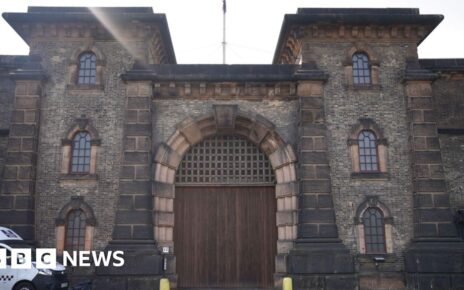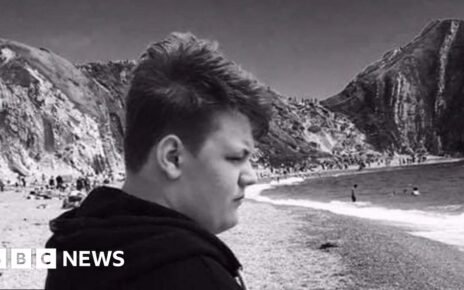[ad_1]
 BBC/Charlie Jones
BBC/Charlie JonesA third of 11-year-olds in England have drunk alcohol, a recent study by the World Health Organization found.
Chloe Ward had her first drink at that age and alcohol dominated her life for the next decade.
She was kicked out of home in Royston, Hertfordshire and ended up living in a car.
Two years ago, the now 23-year-old moved to Emmaus Norfolk and Waveney, a former convent where she lives and works with 30 other people who were also previously homeless.
Here, in her own words, she explains her path to getting sober and her plan to thank the charity that she says saved her life.
‘My first alcoholic drink was a whisky and lemonade’
 Chloe Ward
Chloe WardAlcohol has always been a big thing in my family and it was around from when I was a very young age. I was about 11 when I started drinking.
I realised quite quickly the way it made me feel and that I could change the way I felt and escape from my life. It changed me as a person and at the beginning it felt good, it felt nice. From then on, I used it for day-to-day living. It was a survival technique really.
One of the first drinks I had was a whisky and lemonade, but I would drink beer, Baileys, sambuca and vodka.
There was a point when everything changed and I started taking drugs, when I was about 14.
I started smoking weed and I did cocaine for the first time at 16. I was still going to school every day but I missed out on so much. It’s not a normal way to grow up.
I don’t remember a lot of my childhood. I wasn’t living. I was just existing. I didn’t know what living was.
‘I lived in my car for three months’
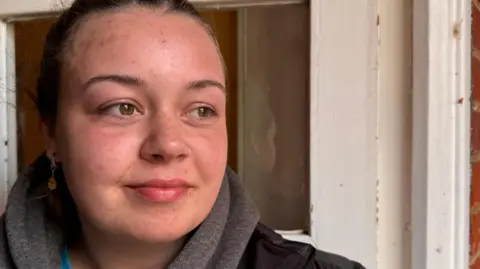 Mike Liggins
Mike LigginsI used to get panic attacks every day. I got excluded from school multiple times. I got kicked out of home at 16 and I moved into various places but I kept on messing things up.
I started working in a pub at 18 and I hit rock bottom. I had nowhere to live and I put everything in my car and lived in there for three months.
When I was 21 I went to a treatment centre for the first time and I had no idea what to expect. I was absolutely terrified. I was really unwell for the first few days. The first week was a complete haze, it really shocked me. I didn’t quite get [understand] recovery straight away and I started drinking again after leaving. But it was the first time I actually laughed being sober. I met some amazing people I still talk to today.
‘We’re like one big family’
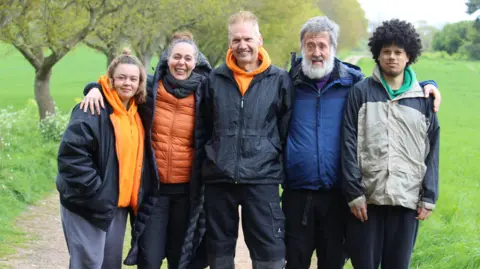 Mike Liggins
Mike LigginsTwo years ago I moved to Emmaus Waveney and Norfolk, which is a charity where I live and work with 30 other people who were also previously homeless. I got a little dog called Teddy and he is my world.
I managed to stop drinking with the support of staff here but after a few months I did relapse again because I was complacent in my recovery. It was so frightening for me, I fell over and they supported me and talked to me for hours. We had an agreement that I would give them my bank cards so that I could not buy any alcohol. When I got paid, they helped me control my money. They organised counselling for me and they helped me work out a plan so I wouldn’t get sucked back in.
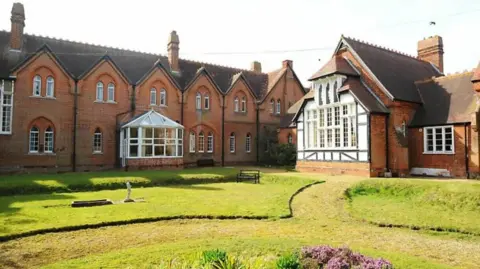 Emmaus Norfolk and Waveney
Emmaus Norfolk and WaveneyWe have our own rooms and there are two houses here and we all sit and eat together, it’s quite special. We are called companions and we work five days a week, with a daily morning meeting where we find out where we are working – usually in the café here or the shop, serving customers. Or we could be on the phone organising taking furniture to people in crisis, driving the vans, growing the veg, baking cakes for the café or making food for us all to eat or upcycling furniture. There is always a level of excitement, it’s never boring, there is always stuff going on.
Isolation for me is a really dangerous thing so knowing there are always people around, in similar circumstances, is really lovely. I’ve known some of the other companions for a few weeks, some for months, and some for years. When someone leaves it’s really difficult because we are like one big family.
‘I haven’t drunk for more than 600 days’
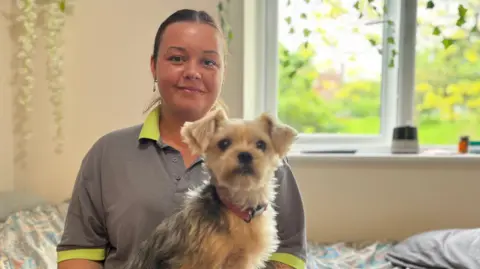 BBC/Qays Najm
BBC/Qays NajmThis August I’m spending six weeks walking 450 miles from Wales to Norfolk to raise money for the charity, with three other companions. The walk arrives back at our home in Ditchingham on 10 October, which is World Homeless Day. The money will be used to sort out 23 rooms where nuns used to sleep here at the former convent where we live. We’re planning to then open a bed and breakfast, which we will help to run. Each room should make around £20,000 in income, which is the amount needed to keep a homeless person off the streets for a year. It’s my way of saying “thank you” because this place has done so much for me.
I haven’t drunk for more than 600 days now and I go to Alcoholics Anonymous meetings every week but it is just one day at a time for me. I still get surprised that I’m doing it and that I have come this far. I do a lot reflection on the past. I’m so grateful for this place and if I wasn’t here I wouldn’t have anything to look forward to in the future. I want other people struggling with alcohol to know there is a way out. You have got to be ready and want it. All you have got to have is the willingness and quite quickly things will change for you. It’s all possible.
If you are affected by any of the issues in this story, the BBC Action Line has information about services that can provide support and advice.
[ad_2]
Source link



